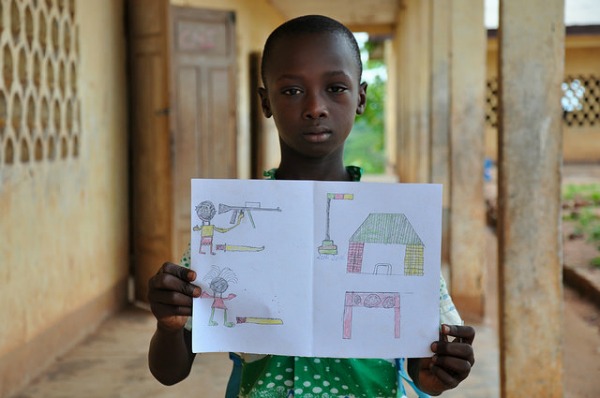
A young boy’s drawing shows his view on life before and after displacement/JRS International
World Humanitarian Day honours aid workers who risk their lives in service, and draws attention to the suffering of millions of people who are caught in violent conflicts around the world.
This year’s World Humanitarian Day campaign theme is #NotATarget and calls for the respect and protection of the most vulnerable in war zones, civilians. Millions of innocent people are trapped in violent conflicts across the world, including 246 million children. António Guterres, Secretary General of the UN has called for an enhanced respect for the lives of these people, and for the aid organisations involved in helping them endure the effects of conflicts.
Civilians are directly affected by war through injury and death caused by attacks, and indirectly through the loss of essential services due to shattered infrastructure. Roads, schools, hospitals and homes are destroyed by combatants bringing all semblance of normal life to a standstill and cutting off access to the food supply and medical services. This causes loss of life due to starvation and untreated injuries and diseases. Attacks on humanitarian groups diminishes the ability of aid workers to help those in need, further exacerbating the crises and increasing fatalities.
HELP US TO SUPPORT CIVILIANS AFFECTED BY CONFLICT IN SOUTH SUDAN
South Sudan Civil War
Since the inception of the state in 2011, South Sudan has been mired in an ongoing serious conflict, where atrocities have been committed against civilians by both government soldiers and opposition fighters. Killings, rapes, torture and the destruction of property have been reported by Government forces, which has had a catastrophic impact on the population. Over six million people are facing emergency levels of hunger.
Since then, more than two million South Sudanese have fled the country, to neighbouring countries; one million people are currently in refugee camps in Uganda alone. A further two million civilians are displaced within South Sudan. Refugees and internally displaced persons are also vulnerable to danger including violence and killing, rape, torture and human trafficking. Children who are separated from their parents are most at risk.
Irish Jesuit Missions supports aid projects that feed and offer protection to those affected by the conflict and resulting food crisis in South Sudan. The violent conflict has affected the ability of the population to grow or transport food, and the skyrocketing inflation rate means that it costs more than what many people can afford.
Wau
St Mary’s Catholic Cathedral in Wau overlooks an IDP camp that is currently home to between 8,000 and 10,000 occupants who are traumatised by war, and are hungry and malnourished. They need food, clean water and shelter. A project sponsored by Irish Jesuit Missions is striving to meet the needs of its occupants by providing food to displaced families, and erecting tents in the camp to accommodate its inhabitants.
Maban
In Maban, north-eastern South Sudan, Jesuit Refugee Service (JRS) provides emergency food relief and other services to internally displaced persons and refugees. Emergency food services focus on hungry, malnourished children and provide baby formula, cereals and milk to families. They also feed students in local primary schools, ensuring that they at least receive one meal that day. Communities will also be given clean water, which is crucial to prevent the spread of life-threatening diseases like cholera.
Irish Jesuit Missions, 17th August 2017

